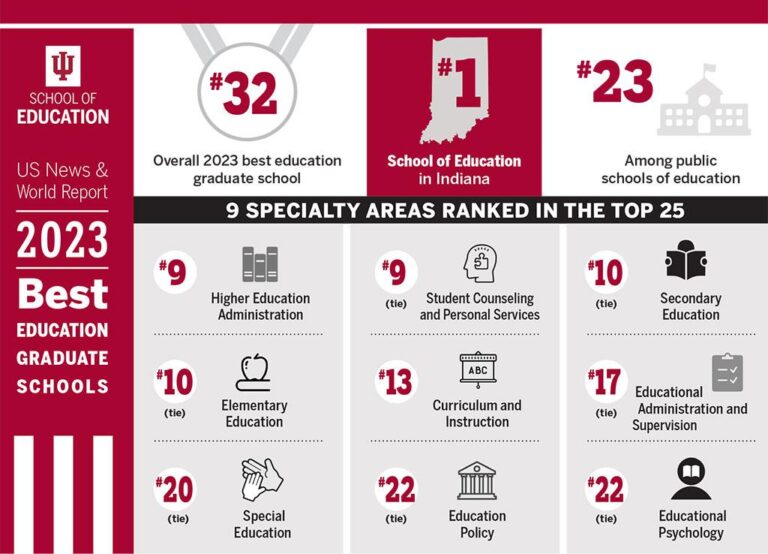Leading U.S. Universities Excelling in Education Degrees: A Comprehensive Overview
Premier Institutions Setting the Standard in Education
In today’s competitive higher education arena, future educators prioritize universities that merge rigorous academics with hands-on training. According to the latest Times Higher Education rankings,several U.S. universities stand out for their exceptional education degree programs. These rankings assess institutions on criteria such as instructional quality, research influence, and reputation within the education sector, offering a reliable resource for students aiming to excel in teaching careers.
Elite private universities like Harvard University and Stanford University lead the pack by integrating groundbreaking research with progressive teaching strategies. Their programs emphasize cross-disciplinary learning and inclusive pedagogy,equipping graduates to effectively address the diverse challenges of contemporary classrooms. Extensive practicum placements and global partnerships further enhance their students’ readiness to thrive in varied educational contexts, from inner-city schools to international settings.
Public institutions such as the University of Michigan and University of California, Berkeley are also gaining recognition for embedding technology and policy analysis into their curricula. Their focus on social equity, community involvement, and evidence-based approaches reflects a commitment to tackling systemic educational disparities. Below is a summary of distinctive program features at these universities:
| University | Primary Focus | Unique Attribute |
|---|---|---|
| Harvard University | Educational Leadership & Policy | Global Education Partnerships |
| Stanford University | EdTech and Innovation | Dedicated Innovation Lab |
| University of Michigan | Urban Education & Community Engagement | Strong Local School Collaborations |
| UC Berkeley | Equity and Social Justice in Education | Research-Intensive Curriculum |
Revolutionary Teaching Programs Preparing Tomorrow’s Educators
Across the nation,innovative education programs are reshaping how future teachers are trained by combining technology,pedagogy,and experiential learning. These initiatives incorporate immersive tools such as virtual reality classrooms, AI-driven student performance analytics, and collaborative projects that span multiple educational environments. Graduates emerge as versatile educators, ready to adapt and lead in dynamic academic settings.
Key components of these transformative programs include:
- Multidisciplinary Curriculum: Merging insights from psychology, data analytics, and cultural studies to develop comprehensive teaching approaches.
- Practical Fieldwork: Early and continuous engagement with community schools to build real-world teaching skills.
- Advanced Technology Use: Employing AI and virtual reality to simulate diverse classroom scenarios for enhanced learning.
- Leadership Training: Cultivating educators who can influence policy and lead educational reform.
| Program | Distinctive Feature | Impact on Graduates |
|---|---|---|
| Virtual Reality Classroom Simulations | Immersive VR teaching environments | Improved classroom management and engagement |
| AI-Based Student Assessments | Instantaneous feedback mechanisms | Customized instructional strategies |
| Community School Partnership Projects | Collaborative initiatives with local educators | Hands-on teaching experience in diverse settings |
Robust Student Support and Career Development Services
Leading universities distinguish themselves not only through academic excellence but also by offering comprehensive support systems that foster student achievement. These include personalized academic advising, mental health counseling, and peer mentorship programs that create a supportive campus culture. Students also benefit from tailored tutoring, skill-building workshops, and access to state-of-the-art educational technology, ensuring they remain competitive in a rapidly evolving field.
Career services at these institutions are equally comprehensive, providing individualized career guidance, resume and interview preparation, and exclusive networking opportunities. Innovative platforms connect students with school districts, nonprofits, and edtech firms, facilitating internships and job placements. The table below outlines key career support offerings:
| Service | Description | Advantage |
|---|---|---|
| Annual Career Expos | Events featuring top educational employers and leaders | Expand professional networks |
| Structured Internship Programs | Hands-on placements in varied educational environments | Gain practical classroom experience |
| Alumni Mentorship Networks | One-on-one support from seasoned educators | Receive career guidance and encouragement |
| Job Placement Services | Access to exclusive job listings and recruitment assistance | Streamline the job search process |
Guidance for Selecting the Ideal Education Degree Program
Choosing the right education degree requires evaluating programs that balance innovative research, hands-on teaching experience, and strong student support. Top-tier programs frequently enough offer specialized tracks such as special education, curriculum design, or educational leadership, enabling students to align their studies with career aspirations. Important considerations include faculty expertise, internship availability across diverse settings, and access to technology-enhanced learning tools.
Flexibility is another critical factor, with many programs now offering part-time, online, or hybrid formats to accommodate different lifestyles. The following table compares select universities based on their distinctive strengths:
| University | Core Strength | Program Highlights |
|---|---|---|
| Harvard University | Excellence in Research | Emphasis on policy and leadership development |
| Stanford University | Innovative Teaching Practices | Strong integration of technology in education |
| University of Michigan | Community-Centered Learning | Extensive fieldwork and local partnerships |
- Accreditation: Verify that the program holds accreditation from recognized educational bodies to ensure quality and legitimacy.
- Alumni Network: A vibrant alumni community can provide valuable mentorship and career opportunities.
- Financial Support: Investigate scholarships, grants, and assistantships that can definitely help offset tuition costs.
Conclusion: Navigating the Path to a Accomplished Education Career
The Times Higher Education rankings serve as a crucial tool for prospective students seeking outstanding education degree programs in the United States. With a broad spectrum of universities excelling in research, teaching quality, and graduate success, aspiring educators have numerous excellent options. As the demand for skilled teachers continues to rise, these institutions remain at the forefront of preparing educators who will shape the future of learning. Staying informed about such rankings and program features empowers students to make strategic decisions about their academic and professional journeys in education.




